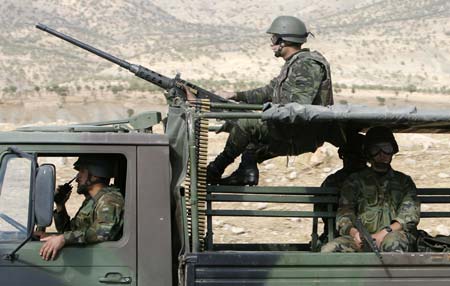For the citizens of the southeastern Turkish city of Diyarbakir, the buzzing of fighting jets has become the order of the day in the past month, during which F-16 jets heading to and from the Turkish-Iraqi border fly overhead every morning.
Turkish commandos sit in military vehicles as they move in a convoy in the south-eastern Turkish province of Sirnak, bordering Iraq, November 8, 2007. (Xinhua/Reuters Photo)
Local residents said it is less than 15 minutes' flight from the military airbase in the city to the border, where air exercises as well as reconnaissance and fighting operations are launched to deal with the militants from the outlawed Kurdish Workers' Party (PKK) based in northern Iraq.
Besides air force, Turkey has massed up to 100,000 troops along the mountainous border with Iraq in preparations for a cross-border operation to crush about 3,000-strong PKK rebels in light of a motion approved by the parliament last month.
A Turkish soldier holds his weapon as he patrols an area surrounded by the rugged mountains in the southeastern Turkish province of Sirnak, bordering Iraq, November 9, 2007.(Xinhua/Reuters Photo)
Moving around in the border region nowadays can be a troublesome, if not dangerous thing. Every morning at daybreak, mine sweeping soldiers operate to clear the way in the border provinces of Sirnak and Hakkari, where PKK activities are most frequent.
Roaming in the southern province of Sirnak and on the way to Hakkari, Xinhua reporters ran into numerous check points manned by soldiers and have been politely denied access to roadways "for security reasons" for twice.
Turkish commandos keep guard as they travel in a military convoy in the south-eastern Turkish province of Sirnak, bordering Iraq, November 8, 2007. (Xinhua/Reuters Photo)
Along the way, military vehicles carrying equipment from cannons and armed vehicles to daily necessities can be seen from time to time.
Heading north from the closest Turkish city to the Iraqi border, Silopi in the Sirnak province to Diyarbakir, the capital of the Diyarbakir province, the reporters ran into many uneasy Kurdish residents.
"Nobody wants a war, which would damage the brotherly relations between the Turks and Kurds, and hopefully there won't be one so that we can stay comfortably at home for the coming winter," said Haci Ozkul, who was picking this year's last batch of cotton in his golden-colored field under afternoon sunshine along with his daughter and five grandchildren.
Mehmet, the keeper of a gas station along the highway, earnestly treated the reporters with tea and urged us to give evaluation on the situation on hearing that we were from the deeper southern border.
He was visibly worried about the situation as well as the prospect of a possible Turk-Kurd polarization triggered by the latest activities of the PKK, especially the October 21 PKK attacks against the troops in the Hakkari province, which left 12 soldiers dead.
According to him, since that attack, many of his Batmanlilar transportation chain company's buses were vandalized in the northwestern parts of the country, simply because their plates indicated that they were from the southeastern region, where most Kurds live and PKK activities are more active.
The Turkish government pledges to maintain its determination to take political, diplomatic and military initiatives to fight against the PKK despite a pivotal meeting between Turkish Prime Minister Recep Tayyip Erdogan and US President George W. Bush in Washington on Monday, which many think staved off a major Turkish incursion into Northern Iraq.
One day after the meeting, the Turkish Prime Ministry said on Tuesday that military means against the PKK remained on the table.
Experts say that while major cross-border actions now seeming unlikely, Turkey is probably thinking about a limited offensive involving raids and aerial assaults, which might include F-16 strikes on rebel positions, helicopter raids and special forces missions.
Many local Kurds, while sympathizing for the PKK which they believe are fighting for a righteous cause of seeking more rights for the Kurdish minorities, began to worry about their livelihood with a war or at least economic sanctions in prospect.
Turkey is pondering economic sanctions against northern Iraq, which might involve closure of border. That would devastate the livelihood of many local Kurds who bet their life savings on the truck route that passes through the Habur gate border in Silopi into Iraq.
Compared to the flourishing northwestern regions, the economy of southeastern Turkey, home to a majority Kurdish population, was visibly far lagged behind, and the inhabitants in the Kurdish region are substantially poorer, less educated and more unemployed than any other part of the country.
Many Kurds are worried about a longer and more pressing sore --unemployment and poverty, even more than a possible war.
Hakki, the owner of a coffee and tea shop in Diyarbakir said that his shop is one of the trades still flourishing in town, as with an unemployment rate as high as 60 percent in the region, coffee shops become a major low-cost haven for many unemployed city dwellers.
Poverty gives rise to crimes like theft. When learned that one of the reporters got pocket-picked days ago in the region, Hakki got excited and said he just lost 570 Turkish lira (US$495) on Friday morning in an errand to a poorer neighborhood.
When he turned to police, he learned that the only thing he could do was to be more careful next time. "It is hard to find a suspect, as even a five or six-year-old in this neighborhood can be a professional," he was told.
(Xinhua News Agency November 10, 2007)




